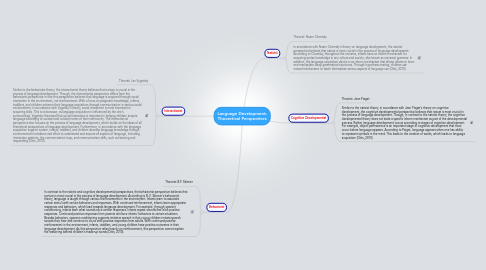Language Development: Theoretical Perspectives
by Esther Miller

1. Interactionist
1.1. Theorist: Lev Vygotsky
1.2. Similar to the behaviorist theory, the interactionist theory believes that nurture is crucial in the process of language development. Though, the interactionist perspective differs from the behaviorist perspective in that this perspective believes that language is acquired through social interaction in the environment, not reinforcement. With a focus on pragmatic knowledge, infants, toddlers, and children enhance their language acquisition through communication in various social environments. In accordance with Vygotsky's theory, social interaction is most important in acquiring skills. This is so because, as language acquisition is influenced by the one's surroundings, Vygotsky theorized that social interaction is important in helping children acquire language according to societal and cultural norms of their community. The interactionist perspective also focuses on the process of language development, which builds on the ideas of all theoretical perspectives of language development. Furthermore, in accordance with the language acquisition support system, infants, toddlers, and children develop language knowledge through environmental motivators and effort to understand and acquire all aspects of language, including interaction patterns, the communication loop, and communication skills, such as listening and responding (Otto, 2010).
2. Nativist
2.1. Theorist: Noam Chomsky
2.2. In accordance with Noam Chomsky's theory on language development, the nativist perspective believes that nature is most crucial in the process of language development. According to Chomsky, throughout the universe, infants have an inborn mechanism for acquiring syntax knowledge in any culture and society, also known as universal grammar. In addition, the language acquisition device is an inborn mechanism that allows infants to learn and manipulate deep grammatical structures. Through hypothesis testing, children use natural mechanisms to teach themselves various aspects of language use (Otto, 2010).
3. Cognitive Developmental
3.1. Theorist: Jean Piaget
3.2. Similar to the nativist theory, in accordance with Jean Piaget's theory on cognitive development, the cognitive developmental perspective believes that nature is most crucial in the process of language development. Though, in contrast to the nativist theory, the cognitive developmental theory does not state a specific inborn mechanism as part of the developmental process. Rather, language development occurs according to stages of cognitive development. For example, object permanence is an important stage of cognitive development that must occur before language appears. According to Piaget, language appears when one has ability to represent symbols in the mind. This leads to the creation of words, which leads to language acquisition (Otto, 2010).
4. Behaviorist
4.1. Theorist: B.F. Skinner
4.2. In contrast to the nativist and cognitive developmental perspectives, the behaviorist perspective believes that nurture is most crucial in the process of language development. According to B. F. Skinner's behaviorist theory, language is taught through various reinforcements in the environment. Infants learn to associate certain stimuli with certain behaviors and responses. With continued reinforcement, infants learn appropriate responses and behaviors, which lead towards langauge development. For example, through operant conditioning, infants learn what sounds elicit certain responses. Infants repeat sounds that elicit positive responses. Continued positive responses from parents reinforce infants' behaviors to certain situations. Besides behaviors, operant conditioning supports imitative speech in that young children imitate speech sounds they hear and continue to do so with positive responses from adults. With continued positive reinforcement in the environment, infants, toddlers, and young children have positive outcomes in their language development. As this perspective relies heavily on reinforcement, this perspective cannot explain the reasoning behind children's made-up words (Otto, 2010).


